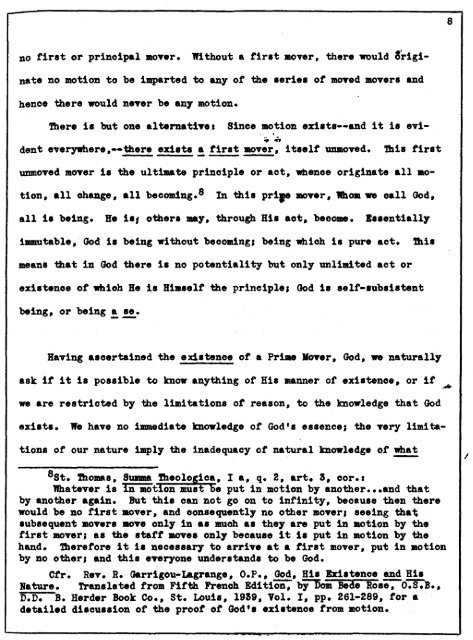Natural Knowledge of God in the Philosophy of Saint Thomas Aquina
Create successful ePaper yourself
Turn your PDF publications into a flip-book with our unique Google optimized e-Paper software.
8<br />
no tirst or pr<strong>in</strong>cipal mOTer.<br />
Without a tirst mOTer. <strong>the</strong>re would ~rig<strong>in</strong>ate<br />
no motion to be imparted to any ot <strong>the</strong> series ot mOTed mOTers and<br />
hence <strong>the</strong>re would neTer be any motion.<br />
There is but one alternatiTel S<strong>in</strong>ce motion exists--and it is eTi-<br />
,<br />
.;<br />
dent eTerywhere.--<strong>the</strong>re exists ~ tirst JIlOTer, itselt unmoTed. !bis tirst<br />
unmoTed moyer is <strong>the</strong> ultimate pr<strong>in</strong>ciple or aot, whenoe orig<strong>in</strong>ate all IlOtion,<br />
all ohange, all becom<strong>in</strong>g. 8 In thll prir JIlOTer, Whoa we oall <strong>God</strong>,<br />
all is be<strong>in</strong>g. Be is, o<strong>the</strong>rs may, through Bis aot, become.<br />
Bssentially<br />
iJlllllUtable, <strong>God</strong> is be<strong>in</strong>g without beoom<strong>in</strong>g, be<strong>in</strong>g whioh is pure act. '!his<br />
meanl that <strong>in</strong> <strong>God</strong> <strong>the</strong>re is no potentiality but only unlimited act or<br />
existenoe ot whioh Be ls Himselt <strong>the</strong> pr<strong>in</strong>oiple; <strong>God</strong> is selt-subsistent<br />
--<br />
be<strong>in</strong>g, or be<strong>in</strong>g a se.<br />
HaT<strong>in</strong>g a.certa<strong>in</strong>ed <strong>the</strong> existenoe ot a Prime Moyer, <strong>God</strong>, we naturally<br />
ask it it is possible to know anyth<strong>in</strong>g ot His manner ot existence, or it "...<br />
we are restricted by <strong>the</strong> limitations ot reason, to <strong>the</strong> knowledge that <strong>God</strong><br />
exists. We haTe no immediate knowledge ot <strong>God</strong>'. essence; <strong>the</strong> Tery limitations<br />
ot our nature imply <strong>the</strong> <strong>in</strong>adequacy ot natural knowledge ot what<br />
I<br />
8St • <strong>Thomas</strong>, Summa Tbeologica, I a, q. 2, art. 3, oor.t<br />
WhateTer is <strong>in</strong> Ilotion must be put <strong>in</strong> motion by ano<strong>the</strong>r ••• and that<br />
by ano<strong>the</strong>r aga<strong>in</strong>. But this can not go on to <strong>in</strong>t<strong>in</strong>1 ty, because <strong>the</strong>n <strong>the</strong>re<br />
would be no tirst mOTer, and consequently no o<strong>the</strong>r mOTer; see<strong>in</strong>g that<br />
subsequent moTers acTe only 1n as muoh as <strong>the</strong>y are put <strong>in</strong> BlOtion by <strong>the</strong><br />
tirst moTer; as <strong>the</strong> .tart moTes only because it is put <strong>in</strong> motion by <strong>the</strong><br />
hand. Theretore it is necessary to arriTe at a tirst mOTer, put <strong>in</strong> Ilotion<br />
by no o<strong>the</strong>r; and this eTeryone understands to be <strong>God</strong>.<br />
Otr. ReT. R. Garrigou-Lagrange, O.P., <strong>God</strong>, His EXistence and Hi.<br />
Nature. Translated trom Fitth French Edition, b~ Bede Ros;:-O:S:B.,<br />
D.D. B. Herder Book 00., St. Louis, 1939, Vol. I, pp. 261-289, tor a<br />
detailed discussion ot <strong>the</strong> proot ot <strong>God</strong>'s existenoe trom motion.


















